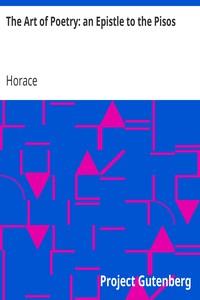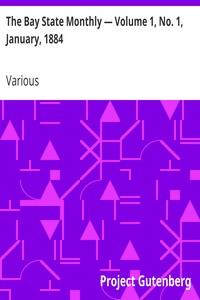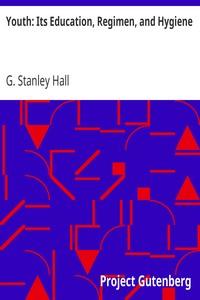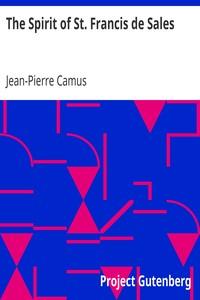Read this ebook for free! No credit card needed, absolutely nothing to pay.
Words: 40156 in 12 pages
This is an ebook sharing website. You can read the uploaded ebooks for free here. No credit cards needed, nothing to pay. If you want to own a digital copy of the ebook, or want to read offline with your favorite ebook-reader, then you can choose to buy and download the ebook.


: The Art of Poetry: an Epistle to the Pisos Q. Horatii Flacci Epistola Ad Pisones De Arte Poetica. by Horace BCE BCE Colman George Translator - Aesthetics Early works to 1800; Didactic poetry Latin Translations into English; Epistolary poetry Latin Transla
Translator: George Colman
Q. HORATII FLACCI Epistola ad PISONES,
DE ARTE POETICA.
THE ART OF POETRY AN EPISTLE TO THE PISOS.
TRANSLATED FROM HORACE
WITH NOTES BY GEORGE COLMAN.
London: Printed for T. Cadell, in the Strand
The Rev. JOSEPH WARTQN, D.D. MASTER of WINCHESTER SCHOOL; AND TO The Rev. THOMAS WARTON, B.D. FELLOW of TRINITY COLLEGE, OXFORD.
MY DEAR FRIENDS!
In a conversation, some months ago, I happened to mention to you the idea I had long entertained of that celebrated Epistle of Horace, commonly distinguished by the title of THE ART OF POETRY. I will not say that you acceded to my opinion; but I flattered myself that I at least interested your curiosity, and engaged your attention: our discourse, however, revived an intention I had once formed, of communicating my thoughts on the subject to the Publick; an intention I had only dropt for want of leisure and inclination to attempt a translation of the Epistle, which I thought necessary to accompany the original, and my remarks on it. In the original, Horace assumes the air and stile of an affectionate teacher, admonishing and instructing his young friends and pupils: but the following translation, together with the observations annexed, I address to You as my Masters, from whom I look for sound information, a well-grounded confirmation of my hypothesis, or a solution of my doubts, and a correction of my errors.
It is almost needless to observe, that the Epistle in question has very particularly exercised the critical sagacity of the literary world; yet it is remarkable that, amidst the great variety of comments and decisions on the work, it has been almost universally considered, except by one acute and learned writer of this country, as a loose, vague, and desultory composition; a mass of shining materials; like pearls unstrung, valuable indeed, but not displayed to advantage.
The learned and ingenious Critick distinguished above, an early ornament to letters, and now a worthy dignitary of the church, leaving vain comments, and idle disputes on the title of the work, sagaciously directed his researches to scrutinize the work itself; properly endeavouring to trace and investigate from the composition the end and design of the writer, and remembering the axiom of the Poet, to whom his friend had been appointed the commentator.
Free books android app tbrJar TBR JAR Read Free books online gutenberg
More posts by @FreeBooks

: The Bay State Monthly — Volume 1 No. 1 January 1884 by Various - New England Periodicals; Massachusetts Periodicals The Bay State Monthly


: Youth: Its Education Regimen and Hygiene by Hall G Stanley Granville Stanley - Adolescence; Educational psychology; Children Health and hygiene Education





